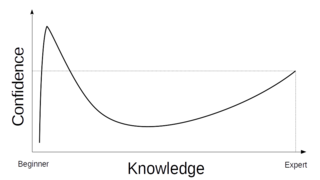Dunning-Kruger Effect
Why You Might Not Know Yourself as Well as You Think
Understanding the Dunning-Kruger effect is valuable for psychological insight.
Posted May 22, 2020 Reviewed by Devon Frye
You’ve probably noticed that people who never tell good jokes somehow believe they’re very funny. Bad drivers, in a similar way, also think they are safer behind the wheel than most other people on the road.
Consider that for a moment and you’ll realize it isn’t a paradox: to recognize one’s own failings, the reasoning goes, one must possess the skills and judgment that would have been necessary to avoid those failings in the first place. This, the so-called Dunning-Kruger effect, was first identified at Cornell University by social psychology professor David Dunning and his graduate student at the time, Justin Kruger (Kruger and Dunning, 1999). After testing the effect using humor, grammar, and logical reasoning, Dunning and Kruger reported that “those with limited knowledge in a domain suffer a dual burden: Not only do they reach mistaken conclusions and make regrettable errors, but their incompetence robs them of the ability to realize it.”

The effect is wide-ranging. Subsequent studies have identified similar effects in a variety of domains, such as chess-playing, performance on college exams, driving, financial knowledge, and even the safe handling of firearms. David Dunning himself has generalized widely about the concept, expressing his certainty that poorly informed individuals are more likely to feel confident in all their opinions, simply because they lack the information that would cause them to question this unearned confidence. Moreover, in Pacific Standard magazine, Dunning opined that the problem of “unrecognized ignorance” is something that affects all people, not just those who might be seen as incompetent.
The effect Dunning popularized, and the very concept of “unrecognized ignorance,” is meaningful in ways that he may never have intended. Significantly, it is directly applicable to psychotherapy. Dunning says in Pacific Standard that “each of us possesses certain foundational beliefs—narratives about the self—that essentially cannot be violated: To contradict them would call into question our very self-worth.” All people, Dunning believes, harbor self-focused beliefs about which they are utterly certain and from which they cannot be dissuaded.
In part, this refers to the difficulty of assimilating new information that might contradict one’s preexisting worldview: According to the concept of cognitive dissonance, contradictory information about the self may be distorted, ignored, or otherwise defended against rather than assimilated. But it also calls to mind the Dunning-Kruger effect, in that most people’s foundational beliefs go unexamined because people lack the perspective from which to evaluate them fairly.
Thus, something like the Dunning-Kruger effect may come into play whenever psychotherapy challenges people to accept a new interpretation for their own behavior. Any effective form of therapy is at least a little bit confrontational, in that it encourages patients or clients to stand back and evaluate themselves in hopes of developing improved self-awareness, on the way to insight. Therapy, seen in this light, is the process of educating people about themselves—of helping them develop enough competence in self-awareness to evaluate (and possibly challenge) their own foundational beliefs.
It’s altogether too easy to believe that you, above everyone else, are an expert in the workings of your own mind. After all, there’s no other person with whom you’re better acquainted, no habit you’ve practiced for longer than that of just being yourself. There’s nothing wrong with being confident, but at the same time, it’s often too easy to see oneself in rigid, self-justifying ways that preclude insight and inhibit growth. We might refer to such a rigid perspective as a false objectivity—a confident, but mistaken belief in clear and total self-understanding.
Consider, for example, an older parent whose children often tell him that his casual insults are hurtful, but who stubbornly views himself as a hilarious, irrepressible kidder. Or imagine a young person whose friendships are repeatedly disrupted by vicious arguments, but sees each of these arguments as the fault of the other people involved.
In other words, try asking yourself if you’ve often heard the same criticism from others on your life, but have never wanted to acknowledge it. Learning to put aside the time-honored narrative you’ve been telling yourself, and choosing to question your own certainties, can powerfully promote psychological growth. In some ways, therapy itself is the process of learning to view your own thought process as subjective and irrational, influenced by both conscious and unconscious emotion. If you can acknowledge your own subjectivity in this way, you will more comfortably tolerate new possibilities—ideas, insights, or new narratives—with which you can reframe your personal history.
To put it more directly, try this: Anytime you’re 100 percent certain that you know something, don’t forget to acknowledge to yourself that there might be a small part of it that you don’t understand.
Facebook image: J Walters/Shutterstock
References
Kruger, J. and Dunning, D. (1999). Unskilled and unaware of it: How difficulties in recognizing one's own incompetence lead to inflated self-assessments. Journal of Personality and Social Psychology, 77(6), p121-1134.
Dunning, D. (2017, June 14). We are all confident idiots. Retrieved from https://psmag.com/social-justice/confident-idiots-92793
Psychology Today. (n.d.). Dunning-Kruger effect. Retrieved from https://www.psychologytoday.com/us/basics/dunning-kruger-effect
Psychology Today (n.d.) What is cognitive dissonance? Retrieved from https://www.psychologytoday.com/us/basics/cognitive-dissonance


